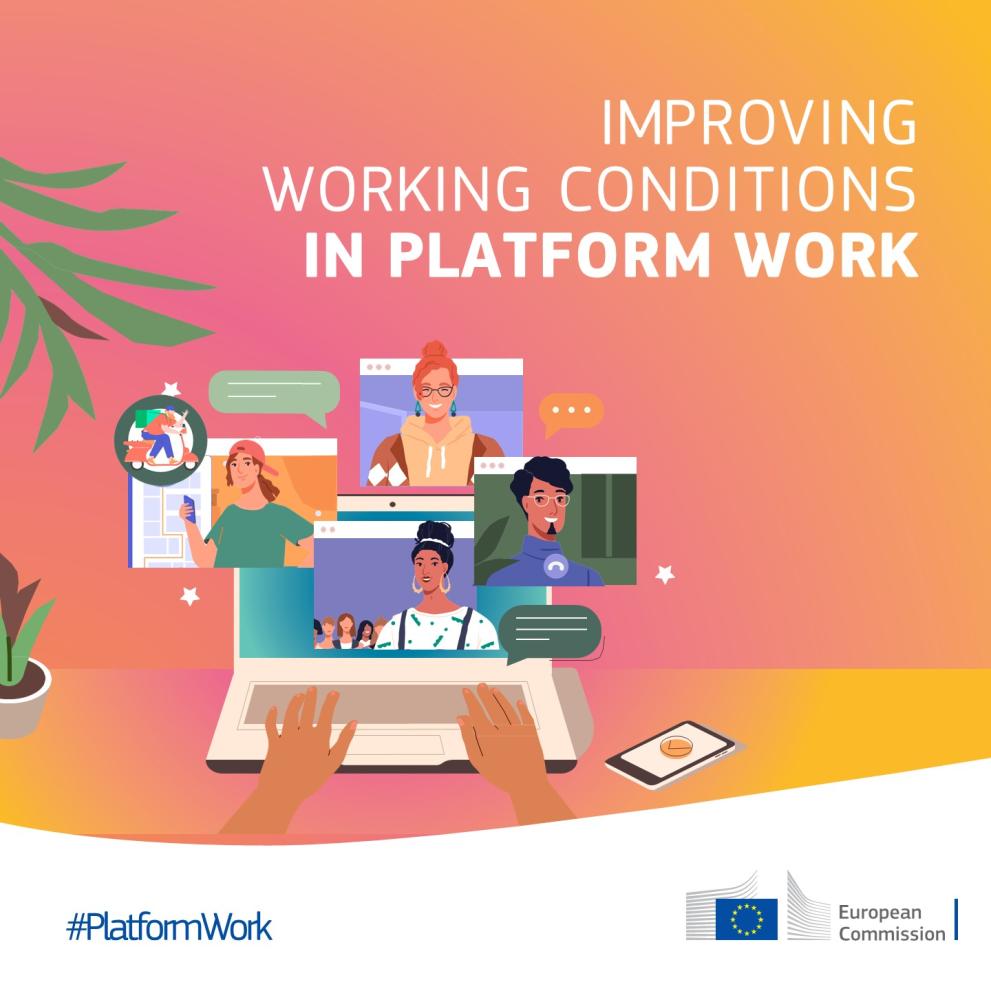
It follows the commitment taken by President von der Leyen in her Political Guidelines to improve the labour conditions of platform workers.
The Directive aims to ensure that people working through digital labour platforms can fully enjoy the labour rights and social benefits they are entitled to. It also aims to support the sustainable growth of digital labour platforms in the EU. Notably, the Directive outlines measures to correctly determine the employment status of people working through such platforms and promote transparency and fairness in algorithmic management (that is, automated systems supporting or replacing managerial functions).
New rules for a fair and competitive platform economy
The Platform Work Directive provides EU rules for a fair and competitive digital labour platform economy, including as regards:
- Employment status
The Directive makes it easier for people working through digital labour platforms to benefit from employment status when it corresponds to their actual work arrangements, and the rights, obligations and benefits associated with it. It establishes a legal presumption of employment relationship with specific indicators to determine whether a platform qualifies as an employer. If the platform meets 2 of these indicators, it is considered an ‘employer'.
The platform or person affected can challenge this presumption by providing evidence that the person or a certain category of person working through the platform is correctly classified as self-employed. The Directive's clear indicators bring legal certainty for platforms and people working through them, reducing litigation and administrative burden.
Thanks to the presumption, platform workers will enjoy the labour and social rights associated with their ‘worker' status, such as a minimum wage (where applicable), collective bargaining, working time and health protections, paid leave, unemployment and sickness benefits, and more. Conversely, genuinely self-employed will continue to carry out their activity without any change in their status.
- Algorithmic management
The Directive establishes new rules governing the use of automated systems in monitoring and decision-making on digital labour platforms. This promotes greater transparency and accountability in algorithmic management, empowering people to be aware of and challenge decisions affecting their working conditions. They have a right to be informed about automated systems and how they function.
The Directive also requires human oversight of the automated systems to ensure their compliance with working conditions and provides the right to contest automated decisions, such as terminating or suspending accounts.
In addition, digital labour platforms will not be able to collect personal data while people working through platforms are not logged into their platforms. They will not be allowed to process data on someone's emotional or psychological state or use artificial intelligence tools to predict for instance whether workers intend to join a trade union or go on a strike. People working through platforms will retain the right to transfer their data from one platform to another, ensuring data portability and the possibility to move seamlessly between platforms.
- Enforcement, transparency and traceability
The Directive enhances the enforcement and traceability of platform work, particularly in cross-border situations, by requiring platforms to declare work in the country where it takes place. The Directive specifies obligations for platforms to declare work and to provide information about their activities and the people working for them to national authorities. This will allow Member States to have clearer picture of the number of platform workers and their situation, empowering national authorities to enforce existing obligations by platforms, including those related to social security contributions.
- Information and consultation
The Directive introduces the requirement to inform and consult platform workers' representatives on algorithmic management decisions. It asks platforms to establish communication channels for workers and their representatives to organise themselves.
- Intermediaries
The Directive ensures the same level of protection for people working through platforms, even if a platform opts to use an intermediary company. In such instances, Member States must establish responsibility mechanisms, and ensure effective access to redress, including through joint liability systems where appropriate.
Next steps
After the formal approval of the agreement by the European Parliament and the Council, Member States will have two years to incorporate the EU Directive into national law.
Background
Digital labour platforms are internet-based companies that intermediate and organise the work provided by workers or self-employed people to third-party clients. Over 500 digital labour platforms are currently active in the EU. They create opportunities for businesses, workers and self-employed, as well as improved access to services for consumers. However, these platforms also encounter challenges due to different laws and court rulings across the EU, hindering their ability to expand their business across borders.
To date, over 90% of digital labour platforms in the EU classify the people working through them as self-employed. Most of these people are genuinely self-employed. However, out of the estimated 28 million people working through platforms in the EU in 2021, 5.5 million may be currently misclassified. Other challenges that can be faced by people working through platforms include a lack of transparency and predictability of their work conditions, as well as health and safety risks, and inadequate access to social protection.
In her Political Guidelines, President von der Leyen stressed that “digital transformation brings fast change that affects our labour markets”. She took the commitment to “look at ways of improving the labour conditions of platform workers”. The Directive on improving the working conditions in platform work is one of the key initiatives of the European Pillar of Social Rights Action Plan. It establishes a common set of EU rules to enable platforms and the people working for them to leverage the benefits of the platform economy, safeguard competitiveness and workers' rights, and ensure fair working conditions.
For More Information
Commission Proposal for a Directive on improving the working conditions in platform work
Questions and answers: Improving working conditions in platform work
Details
- Publication date
- 13 December 2023
- Author
- Representation in Ireland
